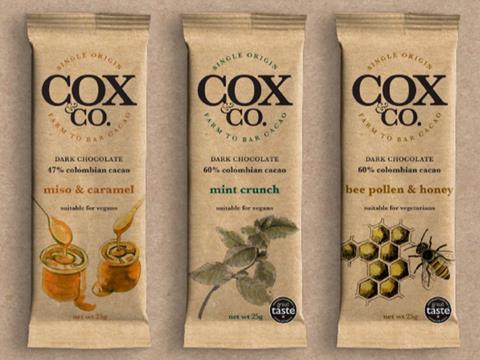
Single origin chocolate brand Cox & Co has created paper flow wrap chocolate packaging, allowing it to phase out all plastics and give consumers a kerbside recyclable wrapping.
Cox & Co’s new paper flow wrap solution apparently has a 12-month minimum shelf life. Designed to replace the company’s compostable plastic packaging, it also aims to reduce the amount of chocolate packaging waste ending up in landfill.
The company states that, at a time where the cost of cocoa has risen significantly due to poor harvests, the new packaging allows the brand to reduce its packaging costs by 35%, offsetting price rises.
Part of a larger confectionery group, the brand aims to roll out the packaging across the board. The new paper packaging will be used across its three flavours: Mint Crunch, Miso Caramel and Bee Pollen & Honey.
“Consumers are now actively seeking brands that take sustainability seriously and products that are easy to recycle,” explains Gavin Cox, founder of Cox & Co. “Chocolate is a popular household purchase and yet so little of the packaging can be easily recycled at curbside. We are set to change all that with our revolutionary new packaging, which offers a neat and tidy result without the use of plastic.”
In similar news, M&S recently announced its early-season Jersey Royal potatoes are being packaged in 100% recyclable paper, in hopes of removing an estimated one million pieces of plastic from the product line in the first year. The paper-packaged potatoes will now be available in 75 M&S Foodhalls across the United Kingdom.
Food company Quaker Oats transitioned into paper packaging for its porridge pot range in January. The new packaging aims to cut down on the use of virgin plastic in porridge pots sold across the UK, with Quaker Oats thought to constitute up to 47% of the country’s porridge pot market.
If you liked this story, you might also enjoy:
Report: The ultimate guide to global plastic sustainability regulation
The Brief: Oxo-(bio)degradables: the who, what, and why of breaking down fossil-based plastics
Sustainable Packaging Summit: How Kraft-Heinz uses collaboration to drive innovation
The Brief: Using ocean-bound plastic in packaging – how, why and should we?














2 Readers' comments